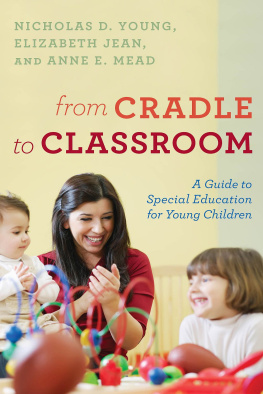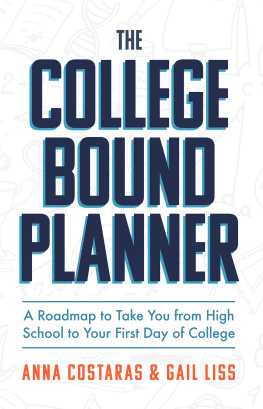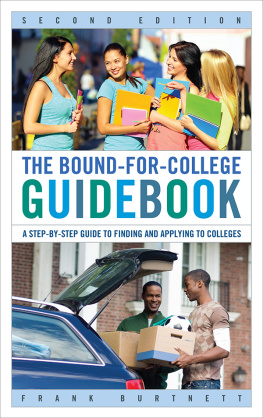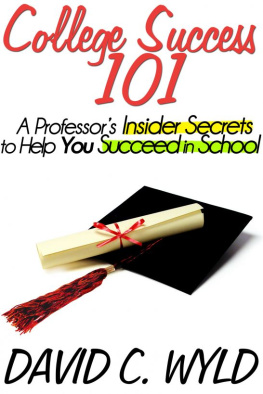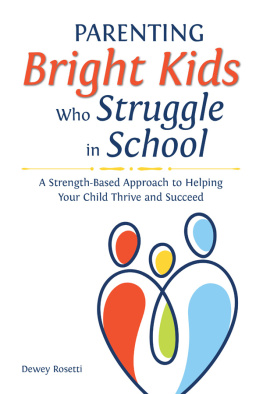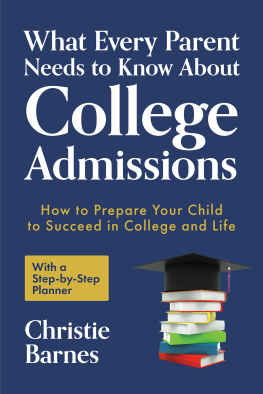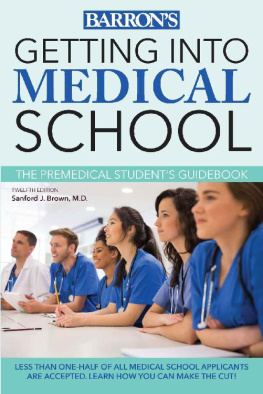RAISING A
GREAT
STUDENT
FROM CRADLE TO COLLEGE
David Heller, Ph.D.
Copyright 2020 by David Heller, Ph.D.
ISBN: Softcover 978-1-7960-8419-1
eBook 978-1-7960-8418-4
All rights reserved. No part of this book may be reproduced or transmitted in any form or by any means, electronic or mechanical, including photocopying, recording, or by any information storage and retrieval system, without permission in writing from the copyright owner.
Any people depicted in stock imagery provided by Getty Images are models, and such images are being used for illustrative purposes only.
Certain stock imagery Getty Images.
Rev. date: 01/27/2020
Xlibris
1-888-795-4274
www.Xlibris.com
799085
In Honor of My Son, Jared Heller, And His Selection As A 2019
US Lacrosse Academic All-American, And In Honor Of Brimmer
And May School, Which Jared Attended for Eight Years And
Which Thoughtfully Nurtured His Growth
CONTENTS
Do not train children to learning by force and harshness, wrote the great philosopher and teacher Plato, but direct them to it by what amuses their minds, so you may better able to discover with accuracy the peculiar bent of the genius of each. I believe this is a lovely, profound and even spiritual thought, and I see this as a guide and ethos for every parent in the socialization of their child. Yet I am also a pragmatist, so I similarly concur with the words of a great American forefather when Mr. Franklin quipped: An investment in knowledge pays the best interest. This is equally meaningful guidance, and well worth adhering to. It is the spirit of these two maxims, offered centuries apart, that moves me to offer this book, a compilation of advice about the intellectual raising of children and about helping those children navigate the challenging and long-winding educational process all the way into higher education.
This book is based on my experiences since my son, now eighteen years old, (Jared) was just a peanut at age four and five, as well as the many discussions I have had with clients and friends about their own experiences, as both parents and children respectively. I begin with some of the foundational activities a parent can implement with a young child and then guide the reader through the early school and middle school years, always bearing in mind the incredible importance of not being overbearing, turning learning into a game, and prominently making learning fun and enjoyable. I then offer considerable detail and advice for the high school years, in part because this period is when identity and self-esteem tend to coalesce and mature. In addition, for practical reasons as well, high school is of paramount importance as the gateway to college, higher learning and the development of initial career planning and the building of a young adult life structure. Ultimately, I address the controversial college admissions process, its many peaks and pitfalls, and present suggestions on how best to comport ones self and ones family through these frequently blustery college admission waters.
Throughout, I will emphasize strategic thinking, employed with affection and integrity. And make no mistake: I believe in high parental involvement but parental encouragement and praise must far exceed the appearances of parental criticisms or any hint of parental rejection. I hope that both parents and their children will find my ideas useful, and enable a success that is forged by the intimate bond between parent and child, a bond that is unshakable and sealed with love.
David Heller, Ph.D.
CHAPTER ONE
THE TEN COMMANDMENTS FOR PARENTS
I
Thou Shalt Not Begin With A Singular
Focus On A School, A College Or
A Major For Your Child.
II
Thou Shalt Not Attempt To Transform A
Musician or Artist Into A Pitc her.
III
Thou Shalt Not Push Academics So Hard
That Everything, Including Li fe
Itself, Is No Fun
IV
Thou Shalt Not Allow Your Criticisms Of
Your Child To Overshadow Your
Praise
V
Thou Shalt Not So Structure Your Child
So He Or She Has Little Ti me
To Be A Child
VI
Thou Shalt Not Expect That Other
People Will Do All The Teaching And
Instruction Of Your Child
VII
Thou Shalt Not Allow Weekends To Become
More Rigorous Than Weekdays.
Heed The Day Of Rest
VIII
Thou Shalt Not Ignore The Wishes of Your
Child Nor Should You Always
Fulfill Those Wishes
IX
Thou Shalt Not Suppress The Creativity,
Originality and Ingenuity of Your C hild
X
Thou Shalt Never Sacrifice A Happy Childhood
In A Misguided Effort To Be
Admitted To An Elite C ollege
CHAPTER TWO
TWELVE IMPORTANT POSITIVE STEPS
EVERY PARENT SHOULD TAKE
I
Encourage Your Child To Try A Great
Variety of Learning Experiences
II
Offer Suggestions To Your Child About
Interesting Activities, But Do Not Order
Your Child
III
Be Resolute About These Three Things
Politeness, Caring About Others &
Required Homework
IV
Believe With Your Whole Heart That
Love and Affection Create The
Best Atmosphere For Learning
V
Understand That Fun Is Not a Four-Letter
Word, And in Fact, Makes Childhood
Go Round
VI
Respect Your Child As An Original
Thinker
VII
Do Get Supportively Involved With
Math, Writing And Reading
VIII
Teach Your Child Never To Hang Their Head When They Dont
Succeed; Encourage Them To Hold Their Head High And Try Again
IX
Reward Effort Always; Tangible Rewards For
Learning Beyond Required Assignments
X
Be Generous With Praise But Make Your
Praise Be Clear and Meaningful
XI
Be Patient With Regard To Your Childs Intellectual
Development; It Doesnt All Happen At One Moment In Time
XII
Be Ever Respectful of The Gifts and The
Challenges Nature Has Bestowed
Upon Your Child
CHAPTER THREE
CHILDHOOD: THE BUILDING BLOCKS
I
Begin by teaching letters and numbers as early as the child will sit for it - but dont be overly persistent. Remember, above all, you are laying the foundation for an enjoyable educational life journey.
II
When your child is four or five, seek out a simple workbook or workbooks that introduces verbal and math concepts clearly and pictorially.
III
Choose the workbooks carefully. In addition to offering colorful visual accompaniment on most pages, the number of questions on a page should be limited to 5-8. If you go in the direction of 20 redundant math problems on a page, you may bore both child and parent!
IV
Never, ever call the learning that your child does outside of school homework. Best to call it fun learning activities or something else that suits your child and you.
V
If possible, as often as you can, try to pair workbook time with something else very pleasurable for your child. Eating breakfast out on a weekend? Time on the playground afterward? Shooting baskets with you? All of these things will build your relationship and your childs relationship to academic and other learning.
VI
Each workbook or learning experience should take no longer than 30-40 minutes with a young child (4-10 years old), and should take place not more often than one or two times per week.
VII
To make things more fun, turn the whole learning experience into a game. For each correct math or verbal workbook answer, record two points for the child and together keep a cumulative written record of points. This is healthy in several ways, not the least of which are: working assiduously toward a goal and developing a comfort with delayed gratification. Both are cornerstones of childhood and of life in general.
Next page

